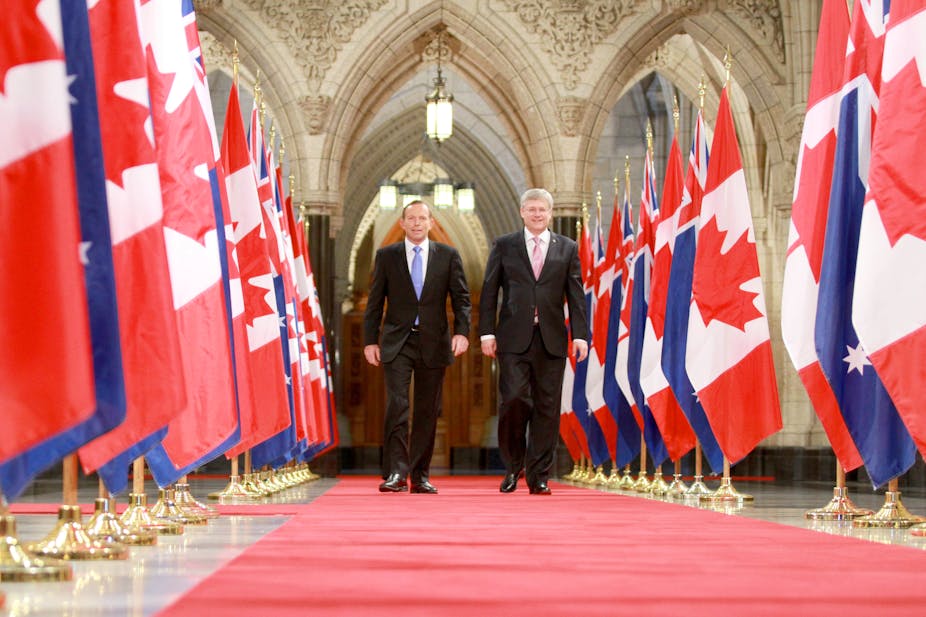On tour in North America, Prime Minister Tony Abbott has forged an alliance with the Canadian prime minister Stephen Harper on climate change. Both champion climate policies that don’t put a price on carbon, claiming that the world is moving away from emissions trading to policies more similar to Australia’s “direct action”.
But this is a distraction. Australia and Canada in their alliance are attempting to sabotage international climate agreements that would, over the longer term, put valuable fossil fuel exports at risk.
In doing so they are repeating the political games of former prime minister John Howard.
“Special interests”
Both Abbott and Harper have framed climate policy in economic terms. Abbott has described carbon pricing as a “job-killer”.
But this is a major distortion: if the economic consequences of meeting a given cap on emissions are to kept to a minimum, most economists agree that emission pricing is the policy instrument of choice.
We should not be fooled. The real economic agenda is to protect carbon-intensive export industries.
Both Canada and Australia have large fossil fuel export industries — coal in Australia (Australia has long been the largest or second-largest coal exporter); and diluted bitumen (“dilbit”) from Canadian tar sands.
These industries are threatened by international climate action that would involve a price on carbon, or any meaningful attempt to limit carbon emissions through “direct action” or regulation.
And the world is undoubtedly moving towards this action. Just last week, US president Barack Obama announced a tightened policy to reduce emissions from old coal-fired power stations by 30% of 2005 levels by 2030.
Following the recent announcements by Obama, a senior Chinese official has foreshadowed the introduction of a cap on CO2 emissions in China’s next five-year plan, which comes into force in 2016.
We’ve been here before …
In Australian climate policy debate has been here before. Under former prime minister John Howard, Australia refused to ratify the Kyoto Protocol, despite easily meeting the very soft targets.
This intransigent stance came at considerable political cost to John Howard, despite Howard rapidly developing an emissions trading scheme before the 2007 elections. One of the first symbolic acts of the incoming Labor government was to ratify the agreement. Why Howard chose this personally self-defeating course is an important puzzle.
In his 2007 book Scorcher, Clive Hamilton, argued that Howard’s stance was a result in part of lobbying by the coal export industry — the so-called “greenhouse mafia”. Tim Flannery in his review of “Scorcher” highlighted the international political context, and the close coincidence of special interests between the US and Australia, and their respective coal industries.
It was convenient for president George W Bush and Howard to cooperate in being the only two OECD countries that refused to ratify the Kyoto Protocol. By undermining Kyoto, Australia and the US helped to protect the commercial positions of fossil fuel exporters where importing countries would otherwise introduce serious caps on emissions.
Brave new allies
In 2012, Harper’s government withdrew Canada’s existing ratification of the Kyoto Protocol, joining the US as the only two OECD non-ratifiers (Australia signed onto the protocol under Rudd in 2007).
It remains to be seen whether Abbott will seek to follow suit in forthcoming successor treaties.
Harper and Abbott acknowledge a kindred spirit in what the latter calls “centre-right” politics. Neither are particularly well disposed to the research efforts of their climate scientist compatriots or to other environmental scientists with relevant knowledge of the hazards involved. Harper has been especially ruthless in this regard.
The Abbott government has declined to enter serious debate about more ambitious targets in the event that the international effort allows such a coordinated response. The present 5% reduction on 2005 levels by 2020 for Australia is derisory compared with other OECD economies.
Fortunately, international cooperation to mitigate climate change is indeed proceeding, albeit still far too slowly. The hopeful signs from the US and from China have already been noted. Even international oil companies are factoring in carbon pricing when considering scenarios for investment planning purposes. It is about time the Australian Federal Government followed suit.
For the heavy carbon polluters and their political protectors such as Abbott and Harper, these real signs of hope are perceived as a threat to export industries. To these special interests the real threat is any serious international accord, whether under UN auspices like Kyoto, or in successor international arrangements (such as might come out of talks in Paris at the end of 2015) and treaties progressed through more direct negotiation.
The Australian and Canadian governments are not merely “pessimists” about the feasibility of international action, and not merely policy laggards or sincere scientific sceptics about the science of climate change. Rather, they are attempting to sabotage international climate action, doing so to satisfy narrow but powerful special interests.

